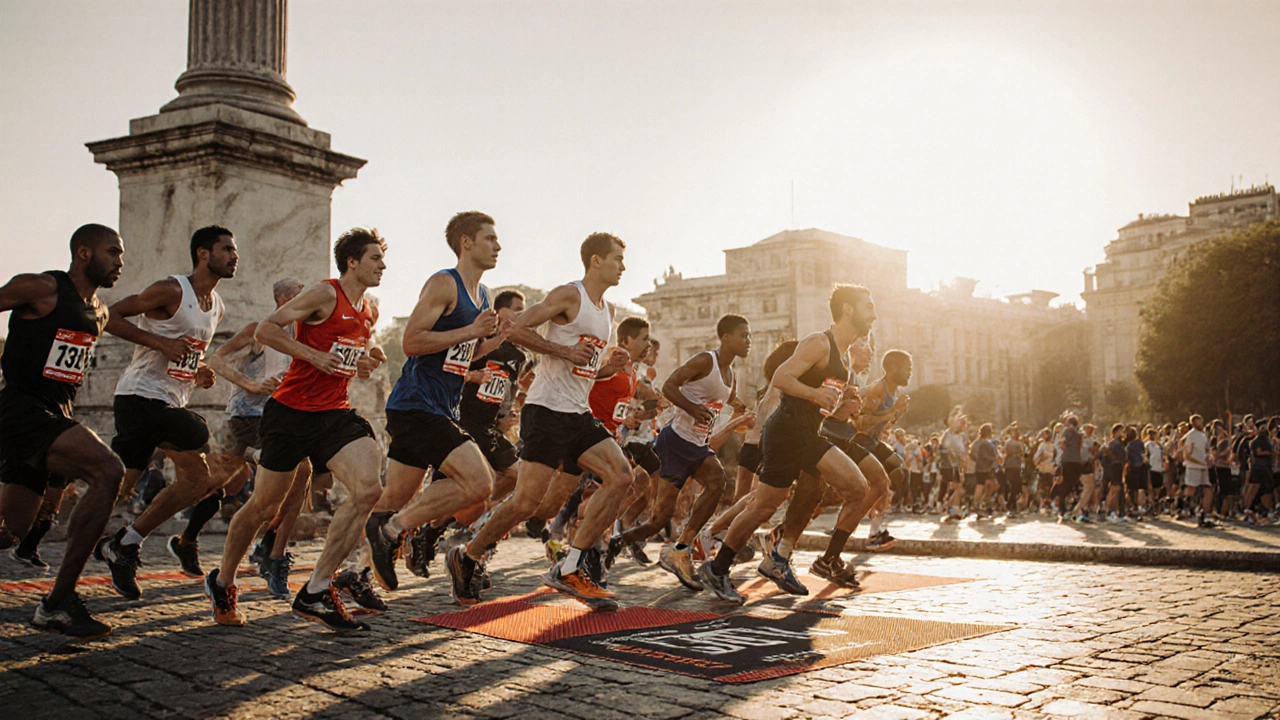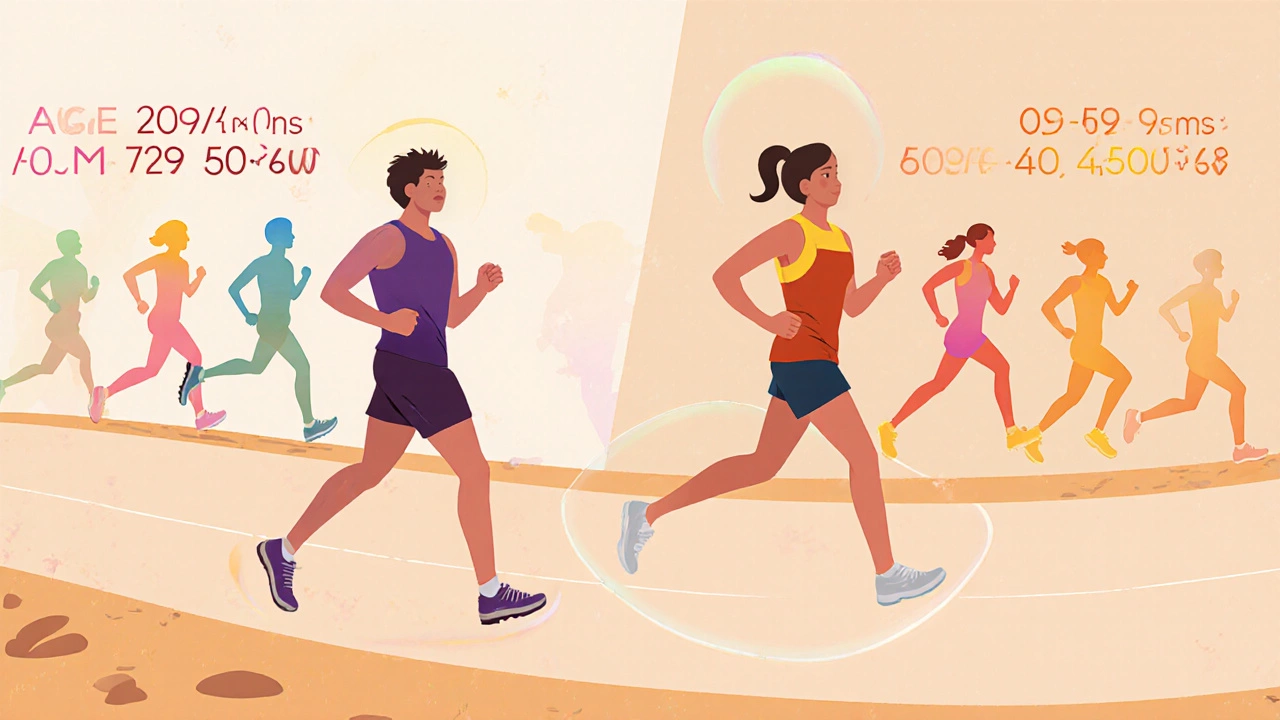Average Marathon Time: How Long Does It Really Take to Finish?
 Oct, 19 2025
Oct, 19 2025
Marathon Time Estimator
Estimate Your Marathon Time
Based on the common method: Multiply your 5km time by 2.5 and add 10% for fatigue.
When you hear “marathon”, you probably picture runners crossing the line after 42.195 km. But how long does it actually take most people to finish?
What a marathon really is
Marathon is a long‑distance road race covering exactly 42.195 kilometres (26.2 miles). It originated from the legendary run of Pheidippides in ancient Greece and has become the ultimate test of endurance for recreational and elite athletes alike.
How finish times are recorded
Every official race uses timing chips or RFID mats at the start, midway, and finish. The system logs a runner’s Finish time in hours, minutes, and seconds. For most events the reported time is "net time" - the interval between crossing the start line and the finish line - which gives a fair picture of how fast a runner actually covered the distance.
Global average marathon time
Across thousands of races worldwide, the average marathon time hovers around 4 hours 45 minutes for men and 5 hours 20 minutes for women. Those numbers come from large data sets compiled by race organizers and running‑statistics sites such as MarathonGuide and RunRepeat.
Breakdown by gender
| Gender | Average time | Typical pace (min/km) |
|---|---|---|
| Male | 4:45:00 | 6:45 |
| Female | 5:20:00 | 7:45 |
These averages mask a huge range. The top 10 % of men finish under 3 hours 30 minutes, while the slowest 10 % take more than 7 hours.

Age‑group influence on finishing time
Age is another strong predictor. Below is a snapshot of typical averages for different age brackets, based on the 2023 World Marathon Majors data.
| Age group | Average time | Pace (min/km) |
|---|---|---|
| 20‑29 | 4:30:00 | 6:25 |
| 30‑39 | 4:45:00 | 6:45 |
| 40‑49 | 5:05:00 | 7:15 |
| 50‑59 | 5:30:00 | 7:55 |
| 60‑69 | 6:15:00 | 9:00 |
Women follow a similar pattern, generally about 15‑20 % slower in each bracket.
Key factors that drive finish time
- Training volume: Consistently logging 40‑80 km per week over several months is the most reliable predictor of sub‑5‑hour finishes.
- Pace strategy: Maintaining a steady Pace (minutes per kilometre) reduces the risk of hitting the dreaded “wall”. Most finishers aim for a target pace within 5‑10 % of their average training pace.
- Course profile: Flat, sea‑level courses (e.g., Berlin, Chicago) yield faster times than hilly or high‑altitude routes (e.g., Boston, Mexico City).
- Weather conditions: Temperatures between 10‑15 °C (50‑60 °F) with low humidity are ideal. Heat above 20 °C (68 °F) typically adds 5‑10 minutes for every 5 °C increase.
- Nutrition and hydration: Proper fueling (30‑60 g carbs per hour) and electrolyte balance keep energy levels steady, especially after the 30‑km mark.
Estimating your personal marathon time
One popular method is the “McMillan Running Calculator”. If you know your recent 10 km time, plug it in and the tool predicts a marathon finish time based on physiological data.
Here’s a quick hand‑calc you can try:
- Take your best 5 km race time (in minutes).
- Multiply by 2.5.
- Add 10 % to account for fatigue.
- The result is an approximate marathon time.
Example: 5 km in 25 minutes → 25 × 2.5 = 62.5 minutes. Add 10 % (≈6 minutes) → 68.5 minutes, or about 1 hour 8 minutes for the full marathon. This rough estimate works best for runners who already have a solid aerobic base.

Sample pacing plan for a 4‑hour target
- Goal finish: 4:00:00 (average pace 5:41 min/km)
- First 10 km: 5:45 min/km - easy, warm‑up phase.
- Next 20 km: 5:40 min/km - steady state. \n
- Final 12.195 km: 5:35 min/km - gradual pick‑up, finish strong.
Adjust the numbers up or down depending on your fitness, course, and weather.
Checklist: What to watch on race day
- Pre‑race breakfast: 2‑3 hours before start, 300‑400 kcal, low‑fiber carbs.
- Hydration: 150‑250 ml every 20 minutes, especially in warm weather.
- Clothing: Moisture‑wicking layers, avoid cotton.
- Shoes: Use a pair that’s been broken in (30‑50 km) but still has enough cushioning.
- Mental strategy: Break the race into 4 × 10 km segments; focus on one segment at a time.
FAQs
What is the world‑record marathon time?
As of 2025, the men’s record stands at 2:00:35, set by Eliud Kipchoge in Berlin 2024, while the women’s record is 2:11:53, set by Brigid Kosgei in Chicago 2023.
Do beginners really need to train for 6 months?
Most first‑time marathoners follow a 16‑week plan that builds weekly mileage from 20 km to 50 km. Longer preparation (6‑12 months) is advisable if you start from a very low base.
How much does course elevation affect time?
A net climb of 100 m can add roughly 5‑7 minutes to finishing time, while a net descent of the same amount can shave a few minutes off.
Is a slower finish still a good achievement?
Absolutely. Completing the distance is a milestone for health, discipline, and mental toughness regardless of the clock.
What’s a realistic first‑marathon goal for a casual runner?
A finish between 4 hours 30 minutes and 5 hours 30 minutes is a common target for runners who log 30‑50 km per week and have completed a half‑marathon.